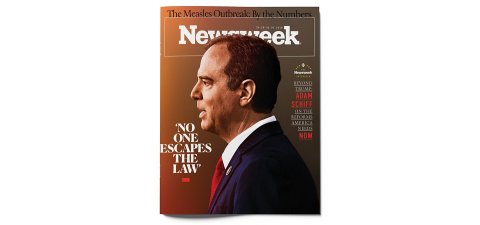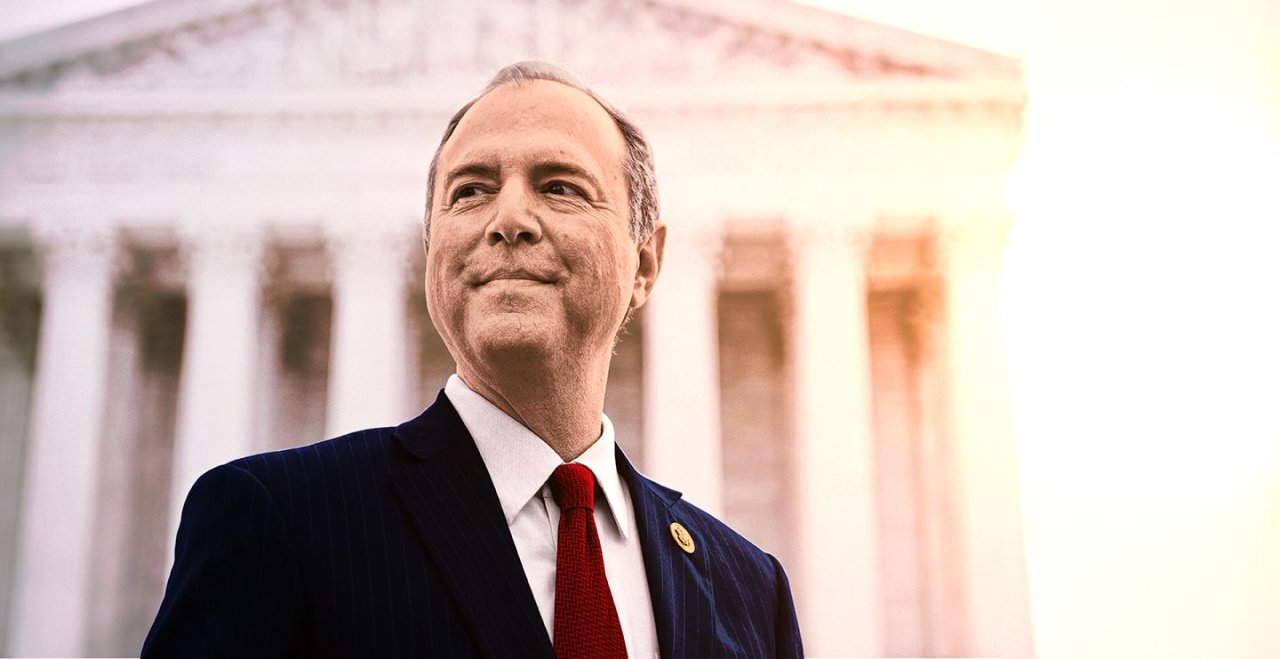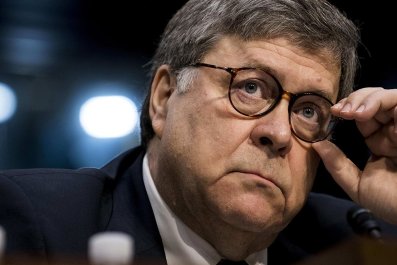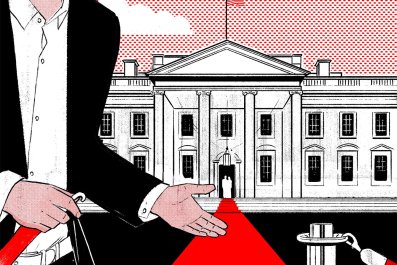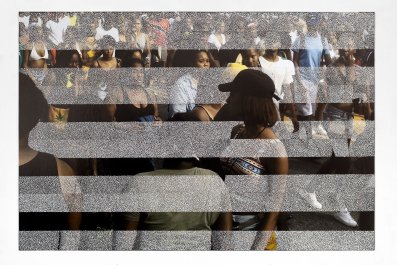
Adam Schiff was angry.It was late March, and Attorney General William Barr had just released his summary of the special counsel's Russiagate report, deflating many Democrats' hopes for impeachment. Republicans, led by President Donald Trump, had spent the past few days trumpeting the finding of "no collusion" and then ridiculing Schiff, head of the House Intelligence Committee and one of the president's fiercest critics, for continuing to press the case against Trump.
Now, in Schiff's own committee room, one by one, GOP members savaged him, demanding his resignation. Representative Michael Turner of Ohio even invoked the red-hunting legacy of Senator Joseph McCarthy, who had brought national disgrace "chasing after Russian Communists" in the 1950s. "Now, we have Schiff chasing Russian collusion," Turner said.
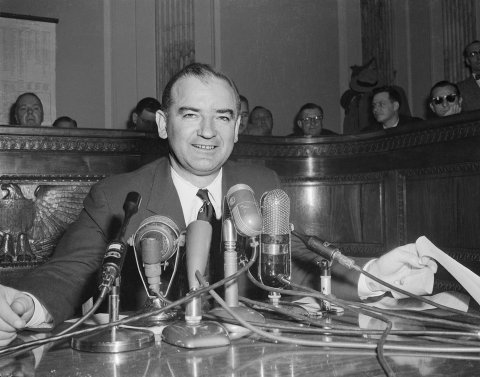
Schiff leaned forward and scanned the room. A former federal prosecutor, he responded with an indictment of his own. "My colleagues may think it's OK that the Russians offered dirt on a Democratic candidate for president as part of what was described as the Russian government's effort to help the Trump campaign. You might think that's OK," he said. "My colleagues might think it's OK that when that was offered to the son of the president, who had a pivotal role in the campaign, that the president's son did not call the FBI, he did not adamantly refuse that foreign help."
For the next five minutes, Schiff laid out his bill of particulars, including national security adviser Michael Flynn lying to the investigators and Trump firing FBI Director James Comey. "You might say that's all OK. You might say that's just what you need to do to win. But I don't think it's OK," he snapped. "I think it's immoral, I think it's unethical, I think it's unpatriotic, and, yes, I think it's corrupt. I do not think that conduct, criminal or not, is OK. And the day we do think that's OK is the day we will look back and say, 'That is the day America lost its way.'"
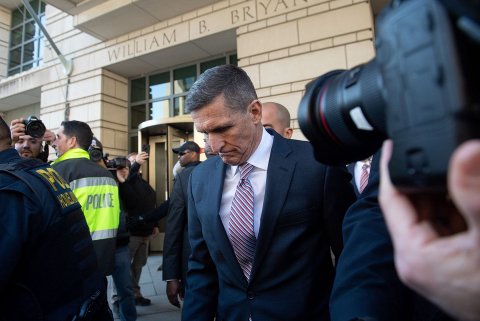
If anyone had any doubts that Democrats would continue investigating Trump as a post–Robert Mueller Washington, D.C., turns to the next presidential campaign, Schiff had extinguished them. The moment went viral, drawing the attention—and condemnation—of the president himself. "Little pencil-neck Adam Schiff," the president said at a rally in Grand Rapids, Michigan, just a few hours after the hearing. The crowd booed their new villain. "He has the smallest, thinnest neck I have ever seen. He is not a long-ball hitter." "Sick," Trump said of Schiff and his Democratic colleagues. "These are sick people."
Yet Trump's denunciations only seemed to strengthen Schiff's resolve. Yes, the Mueller probe is over, Schiff concedes, without delivering a presidential head or even one more indictment to the dozens that have already been announced. But Democrats have much more to investigate, he says, starting with the special counsel's report itself. Barr has indicated the document is almost 400 pages long, excluding tables and appendices—the War and Peace of investigative reports. Schiff and a handful of other powerful committee chairmen have signed a letter beginning the process of authorizing subpoenas for the full Mueller report, including its underlying evidence and materials.
Beyond that, federal prosecutors in New York have dubbed Trump "Individual 1" in a criminal case involving hush money that sent his personal lawyer Michael Cohen to jail. They are also reportedly looking into Trump's reliance on wealthy Russians starting in the late 1990s to keep afloat his real estate and branding enterprises, which have declared bankruptcy four times.
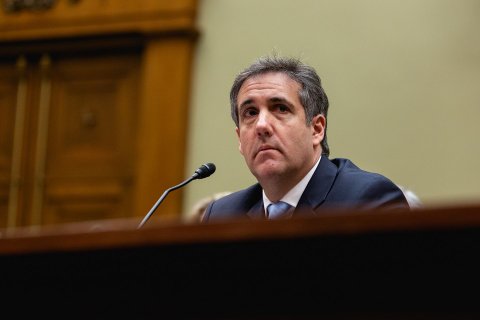
Schiff has claimed that evidence of wrongdoing by Trump "is in plain sight." The top Democrat spoke with Newsweek from his Washington, D.C., office about why he thinks Mueller couldn't nail Trump, why he won't give up investigating the president and how he thinks the rule of law will ultimately triumph.
Let's talk about the difference between unethical behavior and what is actually against American law. Federal court documents in the Southern District of New York and Cohen's testimony could indicate that Trump committed election fraud with his hush money to women. But no one is talking charges. Is it fair to say that in practice, so long as a president retains his party's support, he is above the law?
I presume the only reason the Justice Department didn't take action against Individual 1 is that he is the president of the United States, and he is not subject to indictment. That is not going to be the case when he leaves office. One of the arguments I have been making is that the Justice Department needs to reconsider the policy against indictment of a sitting president in circumstances where the statute of limitations may toll prior to that person leaving office. It may be wise to stay the prosecution or trial. I have been making that argument publicly.
Most of the OLC [Office of Legal Counsel within the Justice Department] opinions of the past analyzed the question of whether you can encumber the president's time by putting him through a trial. There's been very little talk about whether you can postpone a trial. The only argument against that would be whether you place a stigma over a president before they leave office. But that ship has already sailed. Federal prosecutors in New York already identified an Individual 1 who was known to be the president of the United States. So whatever the additional stigma of formally naming the president in an indictment is, weighed against the interest of justice that no one escapes the law because of holding office, I think militates toward indictment and staying prosecution.
In terms of Russia's relationship with Trump, there's a lot we already know. Mueller got 34 indictments, seven guilty pleas and four people sentenced to prison. What does it say about our legal system that this investigation, with all the powers of the state behind it, can't find illegality in any of that with respect to the man in the middle of it?
The way I look at it is this: We should hold our elected officials and especially the president of the United States to a higher standard than mere avoidance of indictment or criminal conviction. We should expect that a president and presidential campaign would maintain ethical standards and act in a moral fashion, and not flirt with crime or, in the case of the campaign contributions, actually commit a crime.
And in this case, my Republican colleagues, as well as the White House, seem to be arguing that as long as the president isn't indicted and can't be indicted, anything goes. That it is perfectly acceptable for the president to call on Russia to hack emails, that it is fine for his son to meet with Russians to get dirt on his opponent, that it is perfectly fine for the national security adviser– designate to have secret conversations with the Russian ambassador to undermine sanctions. Anything is perfectly acceptable. Dozens of unethical acts.
It simply cannot be that our standard now is so dumbed down to be simply whether something is criminal or not. I don't think Americans feel that way. I think they hold elected officials, including the president, to a higher standard.
Does this new lower standard suggest to you that the American legal system is flawed and vulnerable when it comes to ethics and corruption and the definition of treason?
I would say our democracy is vulnerable. The rule of law is vulnerable right now because we have an unethical president and we have a leadership in Congress unwilling to stand up. And what that has resulted in is that statutes we put into place after the last flagrant abuses of power during Watergate have been now broken down. The lesson of the Trump administration is that in only his first two years, the president of the United States, under investigation, can fire the guy doing the investigation—the head of the FBI—and fire the attorney general if that attorney general doesn't ignore the advice of ethics lawyers and protects you. You can replace that attorney general with one who will do your bidding and one who has already opined before his appointment about how the investigation against you is premised on a bogus legal theory. That is the lesson of the Trump administration only two years in the making.
What will it mean for future campaigns if everything Mueller discovered about Roger Stone, Julian Assange, Paul Manafort and the Trump Tower meeting with the Russians to get dirt on Hillary Clinton is actually completely legal?
If this somehow becomes a new norm, then you will find others imitating it. They will engage in any unethical conduct as long as they think they can get away with it. Now, I have to think that when Trump is gone from the White House, Congress on a bipartisan basis will enact new laws to prevent any repetition of the kind of corruption and malfeasance we have seen under this president. The GOP in Congress is unwilling to do it now because they are afraid of Donald Trump, afraid of an angry tweet, of a primary challenge or criticism from the commentators on Fox.
Speaking of angry tweets, personalized smears and attacks have become commonplace in politics now, including those directed at you. What is the key to leadership at this time and in this era, generally, and in your position now, with Republicans calling for your resignation?
I think the key to leadership in the era of Donald Trump is not to allow yourself to be pulled down into the mud with him, to stand your ground, to defend our democratic institutions and the rule of law and take whatever is incoming as we go through this period—to realize the country is worth fighting for and that we need to soldier on as long as our democratic institutions are under such assault.
I co-founded a caucus on freedom of the press with Mike Pence about 15 years ago, and I would never have imagined that this caucus, which was focused on persecution around the world, would need to be now focused on attacks here: a president who calls the press the enemy of the people and who has been reported to try to intervene in a merger involving the parent of CNN because he hates CNN, or raise postal rates on Amazon because he wants to punish Jeff Bezos and The Washington Post. Congress needs to stand up to these assaults on our institutions.
How does Barr's accusation that the FBI spied on the Trump campaign affect American trust in government, and what do you make of the proliferation of conspiracy theories on the right, some involving you?
As a member of Congress and a former assistant U.S. attorney, I was deeply disturbed to see the attorney general make such a cavalier and reckless suggestion that those now under his purview engaged in "spying" on a political campaign. This type of partisan talking point may please Donald Trump, who rails against a "deep state coup" at his political rallies and in the Oval Office, but it also strikes another destructive blow to our democratic institutions.
I'm used to the proliferation of conspiracy theories on the right, many of them fanned by the president himself, but the attorney general isn't just another surrogate for the president—he's the top law enforcement official in the nation, and he should be held to a higher standard.
Why do you think your Republican colleagues in Congress are still interested in investigating the Clintons?
The president needs an enemy to attack and demonize, and vilifying the Clintons has always been pleasing to his base. But when you go beyond just attacking your political opponents to using your authority as president to try to call for them to be prosecuted or locked up, that's an attack on our democracy.
Republicans seem to be stalling the release of the Mueller report and have used the time lag to depict Democrats as "sick" and obsessed with a fantasy. Are you worried that pursuing this will backfire politically on Democrats?
I think the public is solidly behind the full release of the Mueller report, and they see the president…for all his protestations of complete exoneration…is quite obviously alarmed at the prospect of the Mueller report being made public. Nonetheless, Congress voted 420 to zero to do so. We are on solid ground.
In February, you vowed to take the fight to make the Mueller report public to court if needed. Is there a timetable for that action? A triggering moment?
I would expect that the House Judiciary Committee will take the first step after it receives special counsel Mueller's report from Attorney General Barr, assuming Barr provides Congress with an improperly redacted version instead of the full report. We will be working in parallel with the Judiciary Committee to ensure that Congress gets the full report and underlying evidence. At the same time, the Department of Justice and the intelligence community have a statutory obligation to keep our committee fully and currently informed of all counterintelligence findings and information uncovered during the investigation. If they do not do so, we will then decide what compulsion is necessary.
Why continue to pursue Trump at all?
We have a constitutional obligation to do oversight, and in the area of the intelligence committee, we have an additional mandate to protect the country if there was a compromise of the president or people around him by a hostile foreign power that should be exposed. When you have a president who, like this one, lacks character and a commitment to truth, the need for oversight is greater. There is always the risk that your oversight overshadows your positive legislative agenda, but there is also the grave risk, with a president lacking character, of doing too little oversight.
President Richard Nixon resigned only because congressional Republicans chose the Constitution over him. Do you expect Republicans will do that before the end of Trump's term? Isn't this actually a political conflict that can be solved only by elections?
I think it's a sad reality that the president remade the party in his image and did so overnight. It is his party now. I long since gave up hope that the leadership will stand up to him. They say that courage is contagious, but so is cowardice. If the GOP leadership won't defend Congress' power of the purse and will roll over on an emergency declaration of the kind the president declared [to build a border wall] to get around our purse, if you cannot depend on leadership to defend its own institution, how can you depend on them for anything else?
So I don't think there is any remedy here but voting this president out of office.
Looking ahead: How does the ship of state right itself? And do you expect a situation where other foreign powers, seeing how Russians got away with it in 2016, jump in?
I think the greater the repudiation of the president at the polling place, the easier it will be for us to regain our standing in the rest of the world. And to reinforce our democratic institutions at home, I think Congress will take up in short order and pass, on a bipartisan basis, new laws to prohibit a lot of the conduct we have seen in this administration: the interference in the justice department, attacks on freedom of the press, the independence of the judiciary, failure to release tax returns—the list goes on and on. I think we will be looking at statutory remedies that have bipartisan support and that the GOP will not support now because they are concerned with the blowback they will get. I think the GOP realizes we don't want to go through another presidency like this.
Have you actually heard that from Republicans?
Certainly, the Republicans say privately their misgivings about the president in innumerable ways. I think they will not voice those misgivings publicly for fear of presidential retribution. When he leaves office, I am confident they will support reforms to make sure we don't have such abuses again.
